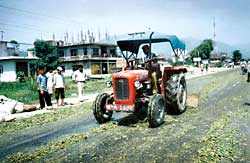 In the past nine months, vehicles have been off Nepal's highways for one full month. National bandas, regional blockades and district bandas have affected more than 7.5 million farmers in central Nepal, destroying livelihoods and endangering Nepal's heard-earned self-sufficiency in the poultry and dairy industries.
In the past nine months, vehicles have been off Nepal's highways for one full month. National bandas, regional blockades and district bandas have affected more than 7.5 million farmers in central Nepal, destroying livelihoods and endangering Nepal's heard-earned self-sufficiency in the poultry and dairy industries. Investments worth more than Rs 7 billion by small-and medium-scale farmers across the region are seriously threatened. In the past fortnight, Rs 250 million worth of vegetables was left to rot, Rs 60 million worth of milk was poured into the rivers.
Padam Chapagain lives in Shankarnagar in Rupendehi. In the last week of bandas, he poured more than 1,000 litres of milk into a nearby stream. Padam is on the verge of tears. His family can't watch this daily tragedy and go inside the house.
Rukmant Pandey, chairman of the Rupendehi Dairy Farmers Cooperative in Manigram, says 5,000 of its members produce 80,000 litres of milk a day. They consume 10,000 litres and the rest is usually sold in the market. "The milk just piles up during bandas, we can't sell it, we can't take it to market, and in the hot season it spoils easily, we can't do anything else with it," he says.
Since the products are perishable and there are limited storage and chilling facilities, frequent bandas and blockades have devastated farmers. There are no facilities to turn the milk into ghiu or yoghurt, so if it can't be taken to market, there is a milk glut. Milk that used to sell for Rs 15 per litre doesn't even go for Rs 9 anymore.
Last week, Chitwan farmers dumped 100,000 litres of milk into drains and rivers. Some farmers found an ingenious way to recycle milk and pumped it into their biogas plants, effectively turning lactose into methane. "It's better to pour it inside the digester than to dump it into the river, at least some of it will become gas that I can use," says Pandey, who pours 25 litres of milk into his biogas plant every day that there is a banda.
In Rupendehi, dairy farmers who took bank loans to buy jersey cows for Rs 25,000 each tried to sell them for Rs 10,000, but there were few takers. Five thousand dairies in Rupendehi alone are on the verge of closing down. Farmers can't afford to feed their cows as it costs Rs 150 per cow per day. Many are letting them out, and there are now hundreds of abandoned cows grazing along the Mahendra Highway. This is creating problems for the Butwal Municaplity and the District Traffic Police, which is simply taking the cows across the border and leaving them in India. Like their cows, bankrupt farmers themselves are migrating to India to find work.
 Farmers in Dhading, Kabhre, Makwanpur, Chitwan, Sarlahi, Mahottari, Gorkha, Lalitpur, Bara, Parsa, Rautahat, Rupendehi and Nawalparasi invested decades of hard work and all their savings to supply the Valley market with produce. Everyday, they exported Rs 10 million worth of vegetables and Rs 3.3 million worth of milk to the capital. Much of this used to come from India up until a decade ago.
Farmers in Dhading, Kabhre, Makwanpur, Chitwan, Sarlahi, Mahottari, Gorkha, Lalitpur, Bara, Parsa, Rautahat, Rupendehi and Nawalparasi invested decades of hard work and all their savings to supply the Valley market with produce. Everyday, they exported Rs 10 million worth of vegetables and Rs 3.3 million worth of milk to the capital. Much of this used to come from India up until a decade ago. Out of the 2,000 poultry farms in Chitwan three months ago, only half are still in business. The current spate of bandas and transportation strikes is sure to send the rest into bankruptcy. Indra Bahadur Bohara used to have 4,000 chickens in his farm, today he has none. It cost money to feed the birds for which there was no market. "I am ruined," he says, "I am going to sell my property, pay off my loan and think about what I will do next."
It costs Chitwan farmers up to Rs 5 per kg to grow the cauliflowers that they are being forced to sell for Rs 1 per kg. They fed the vegetables to their livestock, but there were still mountains of vegetables left. They dumped four tons of it on the East West Highway in protest, blocking 300 metres of the road with vegetables. Elderly farmers by the roadside wept openly when they saw the waste.
Krishna Sapkota has a vegetable farm in Chainpur in eastern Chitwan. He couldn't afford to hire porters to take his produce to market during a banda, so he and a hundred other farmers just let the vegetables rot in the fields and ploughed them over.
Farmers across Nepal are now drowning in their own sweat. They took the risk of investing in agriculture and made this country self-sufficient in poultry, eggs, vegetables and fruits. They turned Nepal into a milk surplus country, reduced the dependence on vegetables imported from India. They are being punished by the political forces who can't agree on sharing power in Kathmandu and the Maoist rebels who would rather destroy livelihoods than build on past successes.
(With reporting by Janak Aryal in Chitwan and Mukeh Pokhrel in Bhairawa)


